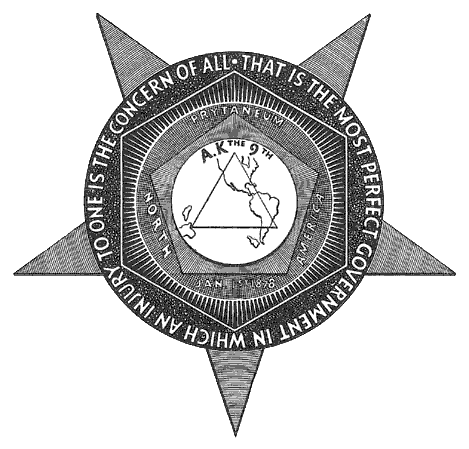Noble Order of the Knights of Labor: Difference between revisions
More languages
More actions
mNo edit summary Tag: Visual edit |
(Haymarket affair) Tag: Visual edit |
||
| (2 intermediate revisions by 2 users not shown) | |||
| Line 1: | Line 1: | ||
{{Infobox political party|name=Noble Order of the Knights of Labor|logo=Knights of Labor.png|founded=December 1869|abbreviation=K of L|founder=[[Uriah S. Stephens]]|dissolution=1949|membership_year=1889|membership=~700,000| | {{Infobox political party|name=Noble Order of the Knights of Labor|logo=Knights of Labor.png|founded=December 1869|abbreviation=K of L|founder=[[Uriah S. Stephens]]|dissolution=1949|membership_year=1889|membership=~700,000|political_orientation=[[Socialism]]|slogan=}} | ||
The '''Knights of Labor''', officially the '''Noble Order of the Knights of Labor''', was a labor organization in the [[United States of America|United States]]. | The '''Knights of Labor''', officially the '''Noble Order of the Knights of Labor''', was a [[Trade union|labor organization]] in the [[United States of America|United States]]. | ||
== History == | == History == | ||
The Knights of Labor was founded by Uriah S. Stephens in [[Philadelphia]] in 1869. It originally contained only garment workers but expanded to other trades in 1871. In 1878, it held its first national convention in Reading, [[Pennsylvania]]. In 1879, Stephens was succeeded by [[T.V. Powderley]] as leader. | The Knights of Labor was founded by Uriah S. Stephens in [[Philadelphia]] in 1869. It originally contained only garment workers but expanded to other trades in 1871. In 1878, it held its first national convention in Reading, [[Pennsylvania]]. In 1879, Stephens was succeeded by [[T.V. Powderley]] as leader. | ||
The Knights of Labor participated in a general strike in 1886 for the eight-hour work day. | The Knights of Labor participated in a [[general strike]] in 1886 for the [[eight-hour work day]].<ref name=":0" /> Following the [[Haymarket affair]], authorities arrested the union's entire executive committees of Milwaukee as well as others from [[New York City|New York]] and Pittsburgh.<ref name=":0233">{{Citation|author=Albert Szymanski|year=1984|title=Human Rights in the Soviet Union|chapter=The Land of the Free|page=162|pdf=https://cloudflare-ipfs.com/ipfs/bafykbzaceazdmtb2y3qq27fve5ib3gk7uv2unt6ae2xss74xmfpur7k5uhl5m?filename=Albert%20Szymanski%20-%20Human%20Rights%20in%20the%20Soviet%20Union_%20Including%20Comparisons%20with%20the%20U.S.A.-Zed%20Books%20Ltd.%20%281984%29.pdf|city=London|publisher=Zed Books Ltd|isbn=0862320186|lg=https://libgen.rs/book/index.php?md5=C597B1232D9EA6B0F3DCB438D7E15A81}}</ref> | ||
[[J. R. Sovereign]] replaced T. V. Powderley as leader of the Knights of Labor in 1893.<ref name=":0">{{Citation|author=[[William Z. Foster]]|year=1952|title=History of the Communist Party of the United States|title-url=http://williamzfoster.blogspot.com/|chapter=The Socialist Labor Party (1876-1890)|chapter-url=http://williamzfoster.blogspot.com/2013/01/chapter-five-socialist-labor-party-1876.html|section=The Knights of Labor}}</ref> | |||
== Membership == | == Membership == | ||
| Line 14: | Line 14: | ||
== Program == | == Program == | ||
The Knights of Labor proposed a program that included labor and land reforms and nationalization of banks, railroads, and telegraphs.<ref name=":0" /> | The Knights of Labor proposed a program that included labor and land reforms and [[nationalization]] of banks, railroads, and telegraphs.<ref name=":0" /> | ||
== References == | == References == | ||
[[Category:Labor movement in the United States]] | [[Category:Labor movement in the United States]] | ||
Latest revision as of 18:57, 16 April 2023
Noble Order of the Knights of Labor | |
|---|---|
 | |
| Abbreviation | K of L |
| Founder | Uriah S. Stephens |
| Founded | December 1869 |
| Dissolved | 1949 |
| Membership (1889) | ~700,000 |
| Political orientation | Socialism |
The Knights of Labor, officially the Noble Order of the Knights of Labor, was a labor organization in the United States.
History[edit | edit source]
The Knights of Labor was founded by Uriah S. Stephens in Philadelphia in 1869. It originally contained only garment workers but expanded to other trades in 1871. In 1878, it held its first national convention in Reading, Pennsylvania. In 1879, Stephens was succeeded by T.V. Powderley as leader.
The Knights of Labor participated in a general strike in 1886 for the eight-hour work day.[1] Following the Haymarket affair, authorities arrested the union's entire executive committees of Milwaukee as well as others from New York and Pittsburgh.[2]
J. R. Sovereign replaced T. V. Powderley as leader of the Knights of Labor in 1893.[1]
Membership[edit | edit source]
The Knights of Labor had 52,000 members in 1883, 111,000 in 1885, and 700,000 in 1886. 10% of its members were women and there were many Black members. Petty bourgeois were allowed in the organization as long as they did not exceed 25% of local membership.[1]
Program[edit | edit source]
The Knights of Labor proposed a program that included labor and land reforms and nationalization of banks, railroads, and telegraphs.[1]
References[edit | edit source]
- ↑ 1.0 1.1 1.2 1.3 William Z. Foster (1952). History of the Communist Party of the United States: 'The Socialist Labor Party (1876-1890); The Knights of Labor'.
- ↑ Albert Szymanski (1984). Human Rights in the Soviet Union: 'The Land of the Free' (p. 162). [PDF] London: Zed Books Ltd. ISBN 0862320186 [LG]
